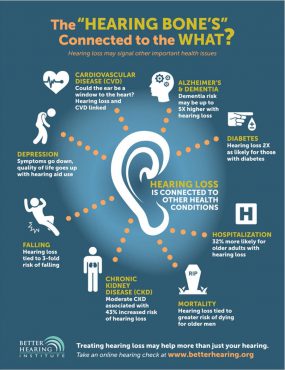Comprehensive Hearing Health Care (Your Hearing Matters) for Patients
As the patient, you should discuss any communication or hearing concerns with your provider. Audiologists are hearing health care providers found at many military treatment facilities (MTFs) and within the TRICARE network.+
+If you experience a sudden hearing loss, developing over a 72-hour period, you should immediately contact your primary care provider for an urgent referral to otolaryngology for diagnosis and treatment. In some cases, if treated in a timely manner, reversal of the hearing loss is possible.4
Background
Have you noticed changes in your hearing, but you aren’t sure what it means, or whether you should talk with your doctor about possible hearing loss? If your telephone conversations have become challenging, or you tend to turn up the volume on your TV where it seems loud to others, it may be time to talk with your doctor. Audiologists can help.They are hearing health care experts located at many military treatment facilities and within the TRICARE network+.
Hearing loss is estimated to affect about 48 million Americans (20% of the population), and its occurrence increases with age.1 It affects daily communication, relationships with family and friends, workplace interactions, and health literacy.2
Health literacy is important, because it’s the degree to which you can listen and understand basic health information and services that are needed to support decisions about your health.3 Even a mild amount of hearing loss can decrease your ability to communicate well with your health care providers, or decrease your ability to share personal and health information with them.
Chronic conditions, like diabetes, or unhealthy lifestyle habits, such as smoking, may place you at an increased risk for hearing loss. Hearing loss, like depression, is a disability that tends to continue for many years. Comprehensive hearing health care includes regular discussions with your providers about communication concerns to help identify difficulties that might show hearing loss not yet diagnosed.
Should You See An Audologist?
If you answer “YES” to more than two of the questions below, you may need a referral to an audiologist or an ear, nose and throat specialist (otolaryngologist). Discuss your results with your primary care manager.
| Question | Yes | No |
|---|---|---|
| Do you have a problem hearing over the telephone? | ||
| Do you hear better through one ear than the other when you are on the telephone? | ||
| Do you have trouble following the conversation with two or more people talking at the same time? | ||
| Do people complain that you turn the TV volume up too high? | ||
| Do you have to strain to understand conversation? | ||
| Do you have trouble hearing in a noisy background (e.g. , restaurants)? | ||
| Do you have dizziness, pain, or rinqinq in your ears? | ||
| Do you find yourself asking people to repeat themselves? | ||
| Do family members or coworkers remark about you missing what has been said? | ||
| Do many people you talk to seem to mumble (not speak clearly)? | ||
| Do you misunderstand what others are saying and respond inappropriately? | ||
| Do you have trouble understanding the speech of women and children? | ||
| Have you had any significant noise exposure during work, recreation, or military service? |
- Frank, R. L., Niparko, J. K., Ferrucci, L. (2011). Hearing loss prevalence in the United States. Arch Intern Med; 171 (20): 1851-1852.
- F. Tysoe, R. (2016). Patient Engagement Through lnterventional Counseling and Physician Outreach. The Hearing Review. Accessed at 23 March 2017 at http://www.hearingreview.com/2016/09/patient-engagementinterventional-counseling-physician-outreach/.
- U.S. Department of Health and Human Services. 2000. Healthy People 2010. Washington, DC: U.S. Government Printing Office. Originally developed for Ratzan SC, Parker RM. 2000. Introduction. In National Library of Medicine Current Bibliographies in Medicine: Health Literacy. Selden CR, Zorn M, Ratzan SC, Parker RM, Editors. NLM Pub. No. CBM 2000-1. Bethesda, MD: National Institutes of Health, U.S. Department of Health and Human Services.
- Otolaryngology-Head and Neck Surgery {March, 2012) Clinical Practice Guid line: Sudden Hearing Loss. Accessed on 11 April 2017 at: http://journals.sagepub.com/doi/full/10.1177/0194599812436449.
